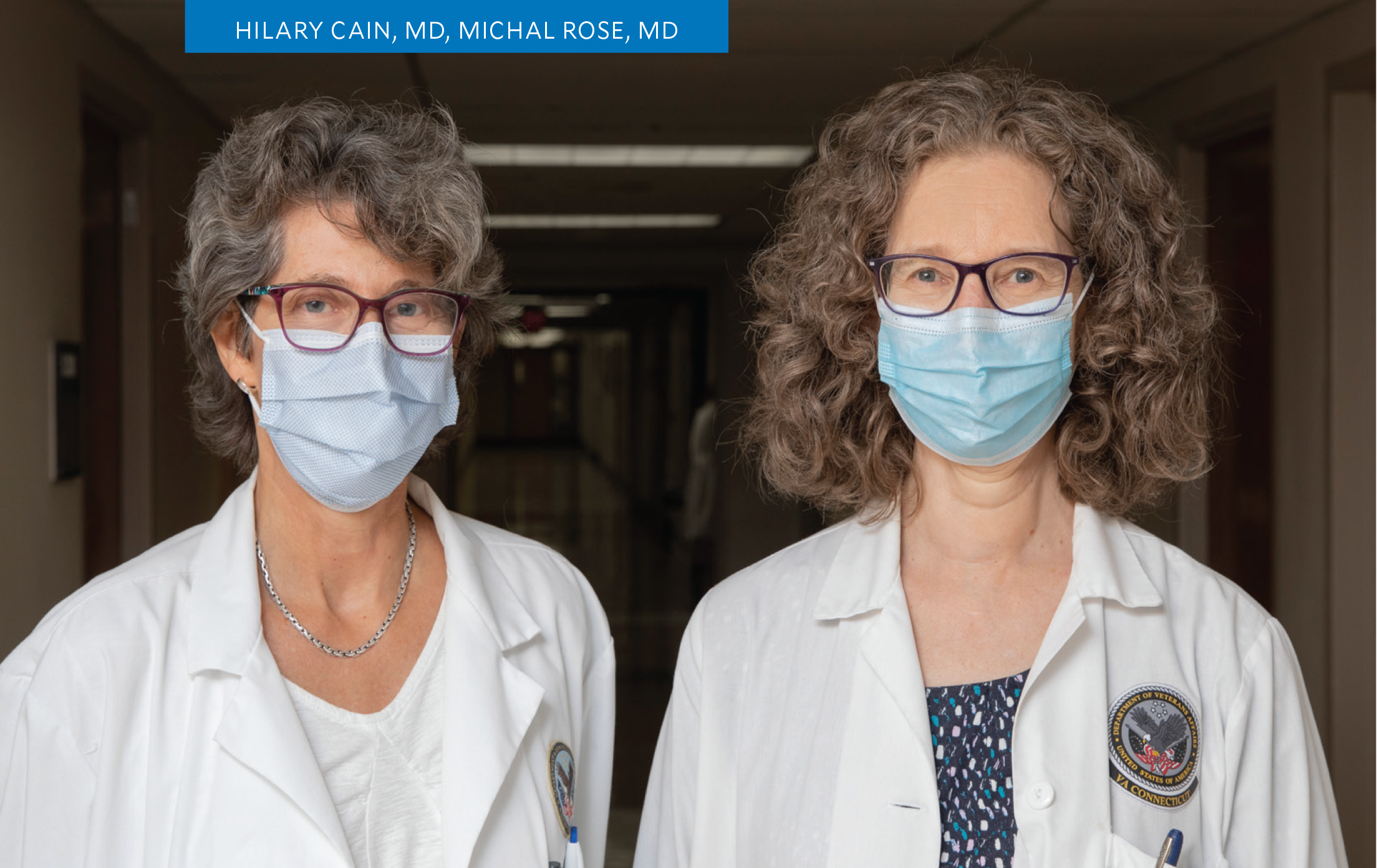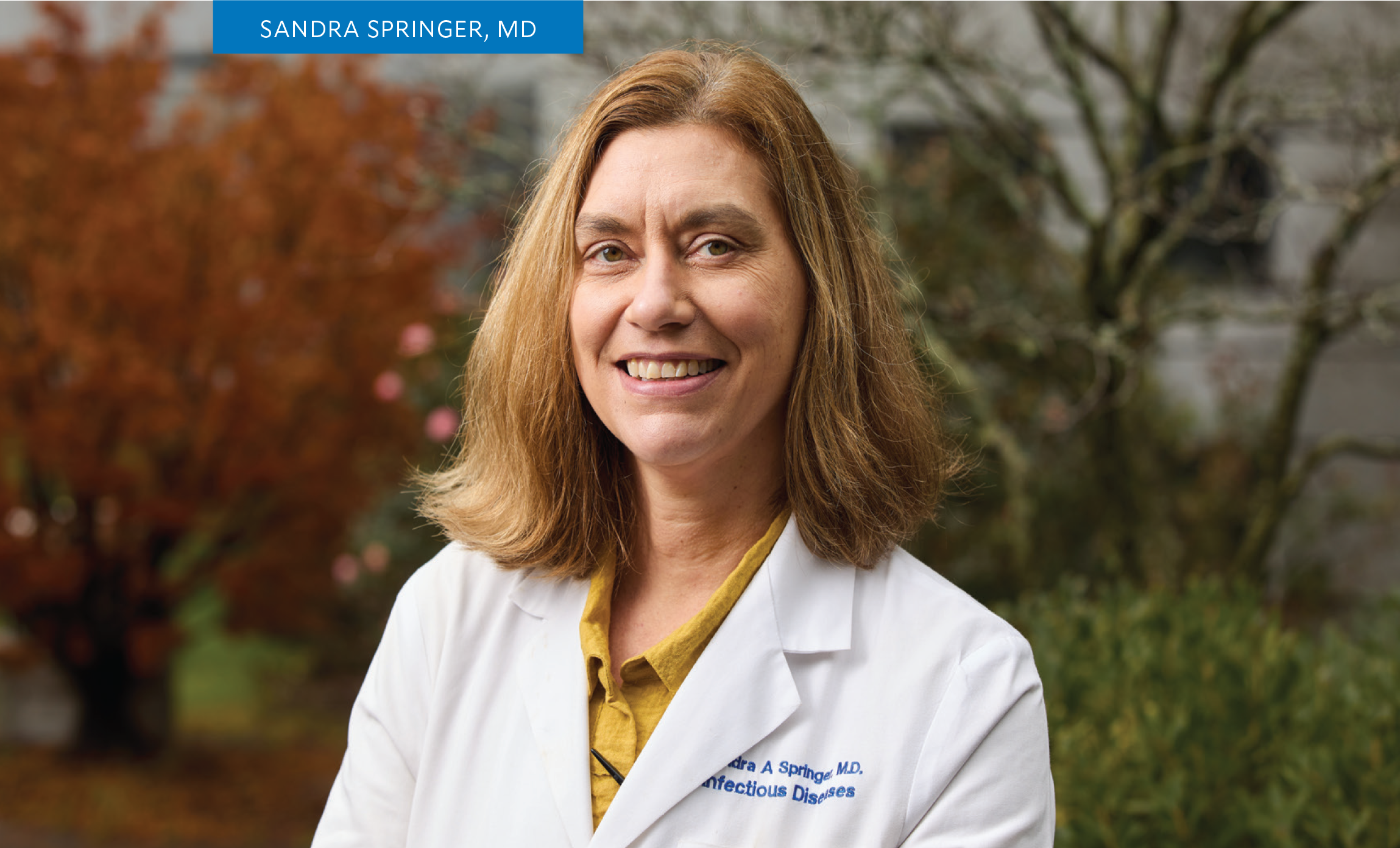Veterans Affairs
Daniel Federman, MD, Vice Chair, Veterans Affairs
At the VA Connecticut Healthcare System (VACHS) in West Haven, Department of Internal Medicine faculty care for patients; train residents and fellows; and perform research across the following subspeciality sections: general medicine, infectious diseases, kidney medicine, pulmonary, cardiology, gastroenterology / liver, allergy and immunology, rheumatology, occupational health, endocrinology, hospital medicine, hematology/oncology, and geriatrics. In addition to the West Haven location, internal medicine faculty care for patients at seven other Community-Based Outpatient Clinics (CBOCs) across Connecticut. Of the 571 total ladder track faculty, 100+ perform patient care full or part-time at VACHS.
In January 2021, Daniel Federman, MD, was named chief of medicine at VACHS and vice chair, Veterans Affairs, for the Department of Internal Medicine. In this role, Federman is working toward more widespread adoption of integrative medicine and whole health. In addition, he is collaborating with other VA leaders to increase veteran enrollment in VACHS.
Allergy and Immunology 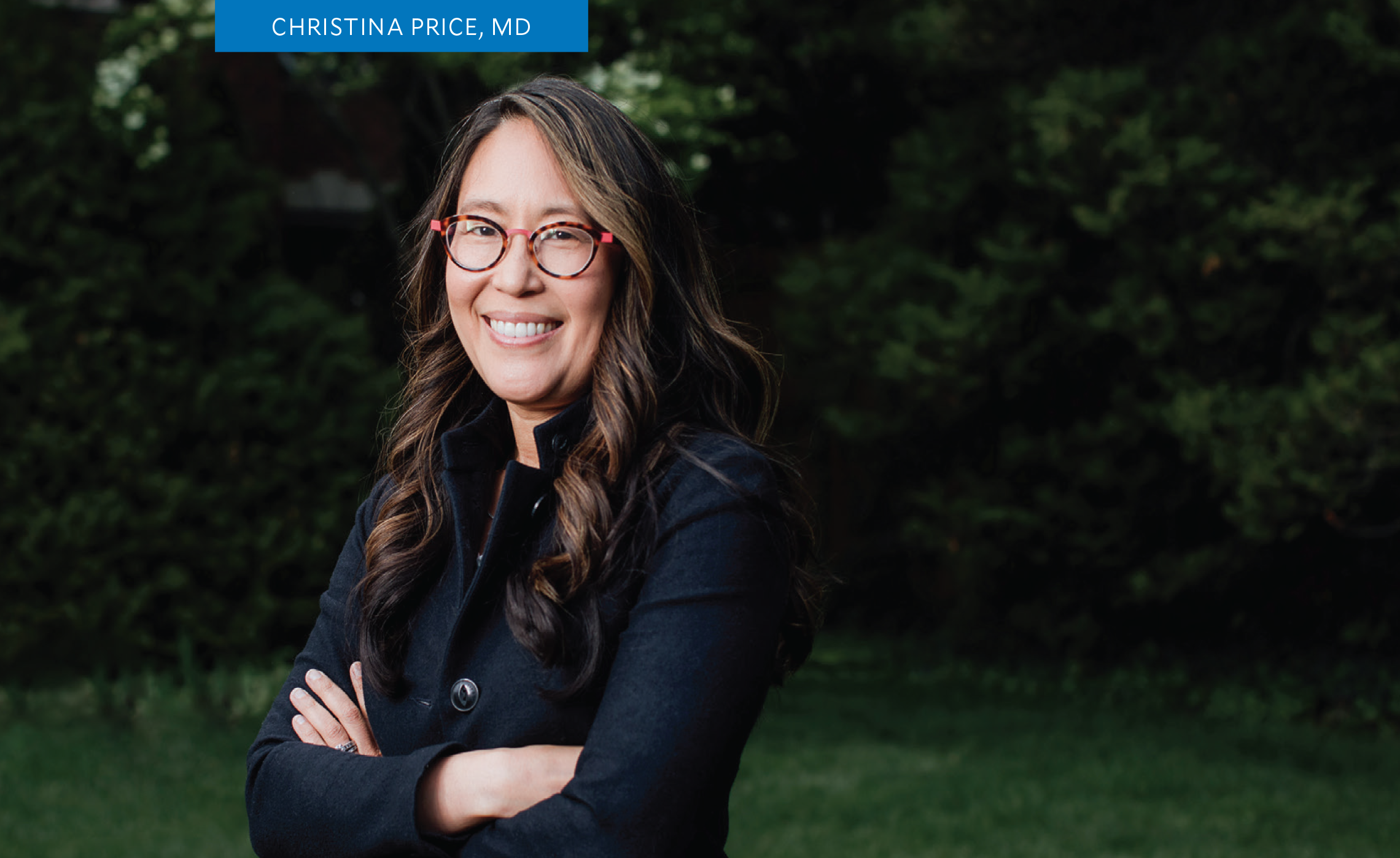
Led by Christina Price, MD, the Allergy and Immunology Section has one faculty member (Price) along with a nurse practitioner, Janina Gilo-Tompkins, APRN, who together support four clinics in West Haven, including inpatient consultations. The team oversees immunotherapy services at each of the CBOCs via telehealth. This past year, an educational program was developed for immunotherapy to expand service across the region. In the coming year, the Allergy and Immunology section seeks to expand its role nationally to provide telehealth service for areas outside the region, in particular with clinical immunology.
Cardiology
The cardiology section has 20 faculty (10 full-time and 10 part-time) serving Connecticut VA patients at two campuses, in West Haven and Newington. In addition to general outpatient cardiology, the section provides subspecialty care in electrophysiology, heart failure, and peripheral vascular disease, for a total of over 16,000 outpatient visits per year. Outpatient general cardiology will expand to the New London location in the spring of 2022.
The section has been designated as a VACHS Clinical Resource Hub for the New England Region in cardiology specialty care. This service provides virtual care in cardiology to smaller VA facilities in Northampton, Massachusetts, and Manchester, New Hampshire. Other clinical initiatives include the opening of a structural program for percutaneous valve replacements, and the expansion of cardiac rehabilitation to include cardiac wellness and primary prevention.
Recently, West Haven was designated a Cooperative Studies Program Network of Dedicated Enrollment Sites (CSP-NODES). This designation is the culmination of a comprehensive application submitted by Judith Meadows, MD, MPH, from cardiology and Mehmet Sofuoglu, MD, PhD, from psychiatry. West Haven is one of only three VA sites to have the three pillars of the VA CSP program: a CSP NODES site, a CSP Coordinating Center (CSPCC), and a Clinical Epidemiology Research Center (CERC). As a NODES site, cardiology will have expanded resources and opportunity for clinical trials and investigator mentoring.
Complementary to clinical research, basic research includes the Cardiovascular Molecular Imaging Laboratory. This lab, run by Mehran Sadeghi, MD, is funded by four federal grants (two R01, one VA Merit, and one DOD). It consists of 1400 sq. ft. fully equipped wet lab space, as well as a chemistry laboratory for SOP-based synthesis of radiotracers for eventual clinical testing. In FY21, the lab published five manuscripts. Azmi Ahmad, PhD, a postdoctoral fellow, was the winner of the American Society of Nuclear Cardiology’s 2021 Young Investigator Award. The Cardiovascular Molecular Imaging Laboratory currently trains four postdoctoral associates at the VA in molecular imaging and vascular biology research.
Daniel Jane-Wit, MD/PhD, has a large program in understanding the role of endothelial cells in solid organ transplant rejection. His lab is funded in part by a VA Merit Review Award specific to hedgehog signaling in the activation of T-cells involved in vascular rejection.
 Endocrinology
Endocrinology
The Endocrinology Section has six faculty members and six fellows who support endocrine clinics in the West Haven and Newington campuses under the direction of Varman Samuel, MD, PhD. Samuel currently has a basic research program in his lab at the West Haven Campus. Barbara Gulanski, MD, MPH, has been the site's principal investigator of the recently completed Glycemia Reduction Approaches in Diabetes: A Comparative Effectiveness Study (GRADE). In the coming year, the endocrine section seeks to expand its role in medical weight management as adjunctive to the VA’s behavioral weight loss program (MOVE!) and also develop clinical programs in the VACHS Clinical Resource Hub for the New England region.
Gastroenterology / Liver
Six of the department’s digestive diseases faculty work, teach, and train fellows and residents at VACHS. Led by chief Guadalupe Garcia-Tsao, MD, FRCP, this group published 80 peer-reviewed original research studies, three editorials, and five separate society guidelines, along with 10 funded grants during fiscal year 2020. Three faculty members serve as associate editors of the following high-impact journals: Garcia-Tsao: New England Journal of Medicine; Wajahat Mehal, MD: Journal of Hepatology; and Tamar Taddei, MD: American Journal of Gastroenterology.
Throughout the year, this section racked up honors and awards. Garcia-Tsao earned lectureship honors from the University of Pittsburgh, the American Association for the Study of Liver Diseases (AASLD), and the University of Florida. Loren Laine, MD, was named section chief of Digestive Diseases and Medical Chief, Digestive Health at Yale New Haven Health in March 2021. He was also honored in April with the Elliot Weser Lectureship by the University of Texas, San Antonio. Fred S. Gorelick, MD, earned the VA Senior Clinical Investigator award in 2021. Taddei was named vice chief, Development, for the Section of Digestive Diseases and became an executive committee member in Yale’s Committee on the Status of Women in Medicine (SWIM). In addition to these honors, many of the VA faculty serve in diverse leadership positions globally.
Garcia-Tsao serves as a member of the AASLD Foundation Board. Laine serves as chair of the Fecal Microbiota Transplantation National Registry Steering Committee, and of the Digestive Disease Week Council. Throughout the pandemic, faculty were flexible to ensure patients received necessary care. Mehal assisted in the adaptation of patient care in the liver clinic to increase the availability of tele-consultations.
General Medicine 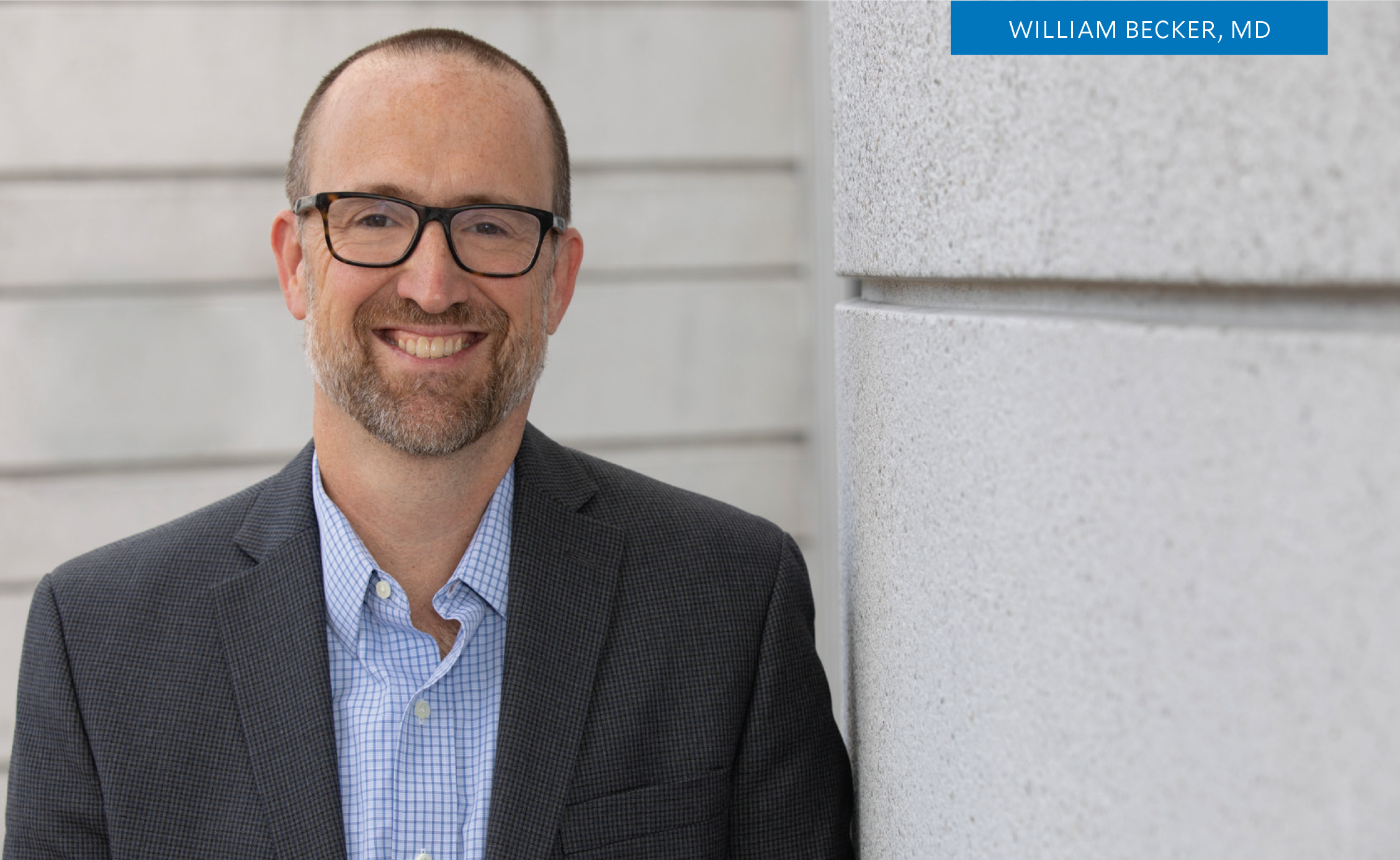
The general medicine section has 26 physician faculty members in primary care and 11 in hospital medicine (see below), and three PhD researchers on the West Haven campus under the direction of Lori Bastian, MD, MPH. Several important transitions have occurred in 2021, including:
- Seonaid Hay, MD, was appointed as director of Graduate Medical Education.
- Christopher Ruser, MD, was appointed associate chief of Medicine.
- Jeffrey Kravetz, MD, was appointed chief of Primary Care.
- Juliette Spelman, MD, was appointed chief of Firm B.
- Rebecca Brienza, MD, MPH, was appointed acting chief of Firm A.
- Caroline Falker, MD, was hired to direct the VA Connecticut’s Homeless Patient Aligned Care team (H-PACT).
As a new faculty member, Falker also has expertise in addiction medicine and has conducted research in medical therapy for opioid use disorder.
Under the direction of Bastian, the Pain Research, Informatics, Multimorbidities, and Education Center (PRIME) has four focus areas:
- Pain & Opioids: Conduct research to improve pain care for veterans.
- Women’s Health: Conduct research to improve women veterans’ health.
- LGBTQ Health: Conduct research to improve LGBTQ veterans’ health.
- Emerging Areas: Headache, violence prevention, eating disorders, HIV/AIDS, COVID-19, insomnia, nursing, pulmonary and cardiology.
The PRIME Center includes 25 investigators and supports 43 funded studies with total funding in FY21 of over $32M. More than 50 manuscripts from general medicine faculty were published this year. Recently funded studies include:
- Role of Nonpharmacological Pain Treatments in Safe and Effective Opioid Tapering in Chronic Pain. Investigators: Anne Black, PhD, and William Becker, MD; Funding: VA Health Services Research and Development Service (HSR&D)
- National Mortality Study and Disrupted Care Research Coordination: Investigators: Louise Davies, MD, and Amy Justice, MD, PhD. Funding: VA HSR&D
- The HIV and Alcohol Research Center Focused on Polypharmacy: Principal investigator: Justice. Funding: National Institutes of Health, National Institute on Alcohol Abuse and Alcoholism
- VA Advanced Fellowship in HSR&D: Investigators: Bastian and Rani Hoff, MPH, PhD. Funding: VA
Current VA HSR&D fellows include:
- Kathryn Min, PhD
- Danielle Wesolowicz, PhD
- Minhee Sung, MD [General Medicine]*
- Jacob Eleazer, PhD
- Vu-Thuy Nguyen, PhD
Geriatrics
Geriatrics at the VA is multifaceted and encompasses Yale faculty on the Geriatrics Consult Service, Home Based Primary Care Program, and Community Living Center. In all aspects of clinical, educational, and research efforts at the VA, providers focus on the 4M Framework of Age-Friendly Health Systems to include Mentation, Medication, Mobility, and what Matters. Yale Geriatrics works collaboratively across VA and Yale campuses under the leadership of section chief Terri Fried, MD.
VACHS welcomed Gregory Ouellet, MD, MHS, to the Geriatric Consult Service and to expand geriatric services through the VA’s Clinical Resource Hub. The Geriatric Consult Service is working with the VA’s Geriatric Surgical Verification Program leadership to provide best practices in perioperative management of older veterans. Marcia Mecca, MD, continues deprescribing efforts within the VA Center of Education in Interprofessional Primary Care with new adaptations to virtual care. Fried and Mecca received funding to participate in a HSR&D-funded multi-site trial to implement the Patient Priorities Care approach in primary care. The Home Based Primary Care Program, under the medical direction of Maura Singh, MD, has developed innovative initiatives to meet the needs of homebound veterans in the face of the COVID-19 pandemic. Singh and Mecca have worked collaboratively on a new deprescribing project for older homebound veterans with polypharmacy and received funding from the VA Patient Safety Center of Inquiry on Medication Safety in Older Adults. Singh also became the primary care geriatrician for the interprofessional clinic devoted to veterans with amyotrophic lateral sclerosis. The Community Living Center, directed by Chandrika Kumar, MD, maintains its five-star rating and serves veterans needing short term rehabilitation or inpatient hospice services with numerous quality improvement efforts. Kumar developed an interprofessional fellow rotation for the Community Living Center; and Shin Lin, MD, developed a pre-clerkship hospice training for medical students.
 Hematology / Medical Oncology
Hematology / Medical Oncology
Eight faculty members care for patients with cancer and hematologic disorders at VACHS. The VACT Hematology/Medical Oncology clinical trials program is very active within the National Cancer Institute’s National Cancer Clinical Trials Network (NCTN) of the National Cancer Institute. Since 2019, this section has been the top-enrolling site for NCTN studies across the Department of Veterans Affairs. Among NCTN studies, the program is one of the top enrolling sites to the National Myelodysplastic Syndromes (MDS) Natural History Study; the Lung-MAP Clinical Trial; the ALCHEMIST Chemo-IO Study; and the Pancreatic Cyst Surveillance Program.
VACHS was selected as a hub site for the Lung Precision Oncology Program, a partnership between the National Oncology Program Office and the Office of Research and Development to optimize lung cancer care. The primary investigators are Hilary Cain, MD, and Michal Rose, MD. Over the past year, hematology and medical oncology faculty were recognized for their excellence. In June 2021, Herta Chao, MD, PhD, was awarded the 2021 David S. Fischer Oncology Teaching Award. In addition, Rose was chosen as co-chair of the American Society of Clinical Oncology hepatocellular cancer guidelines committee.
Hospital Medicine
The Hospital Medicine section launched in 2010 with two hospitalists. Since then, the team has grown to 11 physicians. Since 2018, Craig Gunderson, MD, has been section chief. 2021 was the first year that all medical inpatients were managed or co-managed by hospitalists.
All VA hospitalists attend on one of the inpatient services for a total of 32 weeks per year. Along with patient care, these hospitalists serve in a variety of educational roles, such as teaching through the medical coach educator and professional responsibility courses, and as the clerkship directors for internal medicine and physician assistant student internal medicine rotations. Benjamin Rodwin, MD, serves as associate program director for preliminary residents.
In the past year, this team produced 17 publications in journals ranging from the Journal of General Internal Medicine to BMJ Quality & Safety; presented at four national conferences; and were awarded two Veterans Health Administration (VHA) grants. In 2021, Jurgen Holleck, MD, won the Asghar Rastegar Award for Teacher of the Year at VACHS, marking the fourth year in a row that this award went to members of the hospital medicine group.
In addition to the clinical, educational, and research duties, the hospital medicine group is very involved in VACHS hospital operations, including serving as chairs of three hospital committees (Flow, Patient Safety and Ethics); chairs of two national hospital medicine VHA committees (Hospital Medicine Field Advisory Board and National Hospital Medicine Research Collaboration); and service as local safety champion for the VHA high-reliability organization initiative.
Infectious Diseases
The Section of Infectious Diseases (ID) has nearly 20 faculty at VACHS, including full-time, part-time, and voluntary faculty, led by Richard Sutton, MD/PhD. They have a relatively busy inpatient consultative service, with an increasing number of e-consults each year, and three clinic days (general ID, HIV, and outpatient parenteral antibiotic therapy; the latter is run by Ann Fisher, MD).
This year, Sutton participated in four Data and Safety Monitoring Boards (DSMBs), including one for a Moderna mRNA influenza vaccine. Sutton also performed research with other VA staff on post-vaccine immune responses against SARS-CoV-2. He is NIH-funded for work on HIV elite control.
Sheela Shenoi, MD, MPH, served on the Infectious Diseases Society of America’s Mentorship Program, in addition to its GERM (Grants for Emerging Researchers/Clinicians Mentorship) Program in 2020 – 2021. In December, Shenoi was appointed associate director of the Department of Internal Medicine’s Office of Global Health.
In October 2020, Sandra Springer, MD, and her collaborators were awarded a $11.5M grant from the National Institute on Drug Abuse for ‘Addressing Risk Through Community Treatment for Infectious Disease and Opioid Use Disorder Now (ACTION)’ among justice-involved individuals. This initiative is a multi-site collaboration with Texas Christian University, the University of Texas Southwestern, and Yale University, along with their community and Department of Corrections partners. The five-year project will compare Patient Navigation to Mobile Health Unit service delivery for people who are released from prisons and jails with a history of pre-incarceration opioid use and/or injection drug use who are either living with HIV or at risk of acquiring HIV. In September 2021, Springer became director of the new Justice Center for Opioid Research at YSM, and was invited to be a new member of the IAS-USA Antiretroviral Guidelines Panel.
Rupak Datta, MD/PhD, MPH; Fisher; and Louise-Marie Dembry, MD, continue to be frontline workers against COVID-19 as part of Infection Control and Hospital Epidemiology, as the VACHS numbers are on the rise (as of the publication date) and Omicron is the dominant variant, displacing Delta.
Joseph Vinetz, MD, has an active National Institutes of Health-funded malaria research program based at the Yale School of Medicine campus. Brinda Emu, MD, is similarly funded to investigate links between HIV and common cancers that afflict our veterans.
Kidney Medicine
The Section of Kidney Medicine has seven faculty at VACHS (six at Yale and one at the University of Connecticut), an experienced physician’s assistant, and is led by Susan T. Crowley, MD, MBA. The VACHS kidney medicine section provides crucial leadership to local and national clinical, educational, and professional service committees. Faculty have been recognized nationally as chairpersons for research oversight committees and have been asked to serve as subject matter experts for the National Institute of Diabetes and Digestive and Kidney Diseases (NIDDK); public health (Centers for Disease Control and Prevention), and medical regulatory (U.S. Food and Drug Administration) committees, as well as on the educational committees of such professional societies, as the American Society of Nephrology.
Faculty serve as the executive director of the Veterans Health Administration’s Kidney Medicine Program; co-chair of Yale School of Medicine’s Homeostasis course; medical director of YSM’s Physician Assistant program; and as Yale Department of Internal Medicine's diversity, equity, and inclusion committee representative. The VACHS kidney medicine faculty have recently been recognized by awards bestowed by the ASN for Innovation in Medical Education, and by the National Kidney Foundation (NSF) for excellence in medical education (Seldin Award) and by its highest award, for scholarship and humanism (David M. Hume Memorial Award). The faculty have demonstrated academic excellence by pursuing advanced degrees in related fields (MBA, PhD); executive medical journal editorial service; substantial peer-reviewed publications; and the publication of federal health policy to advance population kidney health.
The team has successfully piloted a novel national Telenephrology Clinical Resource Hub (CRH) to deliver subspecialty nephrology care to underserved regions of the United States, resulting in demonstrable improvements in kidney health outcomes for patients served. The faculty have also ensured uninterrupted local outpatient dialysis services throughout the COVID-19 pandemic and established an array of inpatient kidney replacement therapies to provide the agility needed to meet the pandemic’s surging demands for such care. The section continues to be productive in research at the VA. In collaboration with VA general medicine and VA PRIME Center investigators, kidney medicine investigators secured multi-year NIH/NIDDK-funding to study the impact of novel non-pharmacologic and pharmacologic interventions to reduce pain and chronic opiate use in patients with end-stage renal disease. They have also partnered with VA primary care and the NSF to pilot the use of the NKF’s virtual kidney score platform to advance patient and provider awareness of kidney disease and its treatment. They also conduct bench research to discover the genesis of kidney fibrosis and acute kidney injury and its repair mechanisms.
Occupational Medicine
VACHS Occupational Medicine focused its energies on innovative oversight of our COVID-19 response. Brian Linde, MD, MPH, Louis Fazen, MD, PhD, and their team worked tirelessly on two fronts: clinical COVID response and oversight of more than 3,000 employees during waves of the pandemic, as well as planning, implementation, and oversight of the employee COVID vaccination program. Employee-focused clinical COVID response, this work entailed 24-hour coverage for screening and testing, creation and oversight of increasingly sophisticated testing programs, key roles in infection prevention, and VACHS’s COVID-related incident command and strategic planning.
For employee vaccination, Linde and Fazen devised an operational plan as early as December 2020, as well as a distribution hierarchy and self-scheduling app, leading to one of the earliest and most successful employee vaccination programs in the national VA system. Linde and the occupational medicine department became the de facto professional communication clearinghouse for consistent anxiety-relieving messaging during trying times. In addition, Efia James, MD, MPH, while serving as VISN1 Employee Health Lead, provided invaluable assistance to clinical sites throughout New England with subject matter expertise on pandemic response.
Pulmonary, Critical Care, & Sleep Medicine (PCCSM)
Hilary Cain, MD, has served as co-lead PI for the Lung Precision Oncology Program (LPOP) with Rose (hematology/oncology chief at VACHS) since November 2020. Brett Bade, MD, served as assistant director for VACHS LPOP with Kathyrn Lerz, APRN, serving as the clinical coordinator. The VA’s goal is to transform itself into a system of excellence in precision oncology. Priorities include increasing access to lung cancer screening, clinical trials, and biomarker testing. The award was a joint application between pulmonology and oncology (Cain, Rose) and provides support for a clinical core (clinical coordinator, nurse) and research core (research coordinator, technician) for up to five years.
Lauren Cohn, MD, continues to serve as the director of the Biologics and Advanced Therapeutics in Airway Diseases program. All asthmatic veterans being considered for biologic therapy by a pulmonary provider in the VACHS are referred for evaluation using the electronic(e)-consult process. Through this process faculty and fellows are educated about severe asthma, therapeutic options, and safety and monitoring of biologics for asthma; and this oversight ensures appropriate use of these therapies. Oversight of the asthma biologics program at the VACHS ensures that the pulmonary team works closely with the clinical pharmacists and nursing staff to educate them about various therapeutic options and indications, and to review protocols for drug delivery and monitoring.
Shortly after his academic appointment to instructor at YSM and joining the PCCSM section for VACHS, Edward Manning, MD, PhD, was received multiple awards and honors, including a three-year, $600,000 grant from the Additional Ventures Single Ventricle Research Fund mechanism; National Institute on Aging Butler-Williams Scholar Award; Yale Pepper Center grant recipient and scholar; and a RCCN/AFAR Measuring Biologic Aging Workshop travel award. Manning also successfully published his findings on the novel mechanisms of proximal pulmonary artery stiffening due to chronic hypoxia in Frontiers in Physiology (PMID: 34594238) and passed his critical care and advanced critical care echocardiography boards.
Kathleen Akgün, MD, MS, served as co-PI with Kristina Crothers, MD, (VA Puget Sound and University of Washington) for the VA-funded award “Associations of steroid exposure with severity and outcomes of hospitalized Veterans with COVID-19” (C19 20-406). She continues to collaborate with Shelli Feder, PhD, APRN, from Yale School of Nursing as co-PIs for the VHA Health Services Research and Development Service award “Facility-level variation in palliative care consultation and patient quality outcomes among heart failure decedents” (CIN 13-407, LIPS 96-062). Akgün was also appointed chair of the Ethics and Conflict of Interest (ECOI) for the American Thoracic Society.
Rheumatology 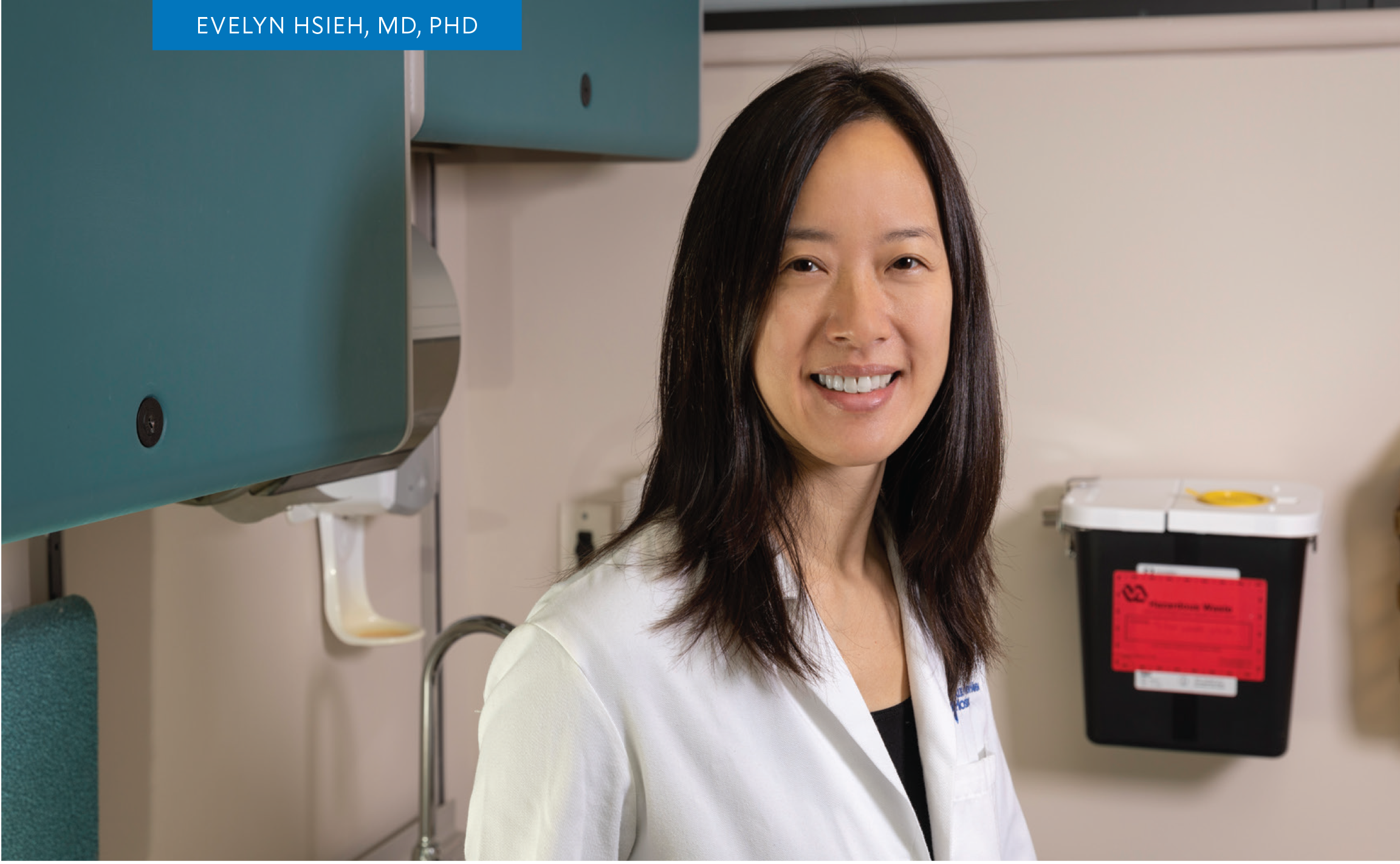
Over the past year, the section’s faculty have worked to expand educational programs for trainees both from Yale School of Medicine and University of Connecticut (UConn). Led by chief Evelyn Hsieh, MD, PhD, the section established and expanded educational training for Yale rheumatology fellows in both musculoskeletal ultrasound and the musculoskeletal exam. Deepa Chandrasekaran, MD, was named the new course director of the musculoskeletal ultrasound course. Carmen Pagan, MD, assists Chandrasekaran as course faculty in conjunction with the VACHS Physiatry department. John Waterman, MD, serves as site director for UConn’s rheumatology fellowship program.
In September, Joshua Bilsborrow, MD, MHS, joined the VACT rheumatology team and provides outpatient and inpatient care along with supervising and educating YSM rheumatology fellows. The six section faculty continue to serve in local clinical leadership roles, and are recognized nationally as chairpersons for committees and sub-committees of the American College of Rheumatology (ACR).
Hsieh works as chair of the ACR’s Global Engagement Special Committee, in addition to serving as co-chair of the organization’s Strategic Planning Task Force. Lisa Suter, MD, continues to serve as co-chair of ACR’s Quality Measures Sub-Committee, a committee she joined in February 2018. Suter also directs a federal quality measurement contract with non-VA effort, which includes supporting inclusion of VA data in the Centers for Medicare and Medicaid Services Hospital Inpatient Quality Reporting Program.
Chandrasekaran chairs the VACHS medical management committee, which discusses the appropriate need for assistive devices for veterans with different medical issues.
Finally, the section has continued to be productive in research both at the VA and beyond, with new NIH funding obtained within the past year for VA-related projects.
* Sung recently received a two-year career development award for her study “Factors that impact long-term buprenorphine adherence among veterans with opioid use disorder: A mixed-methods study.”
-------------------------------------------------------------------------------------------------
